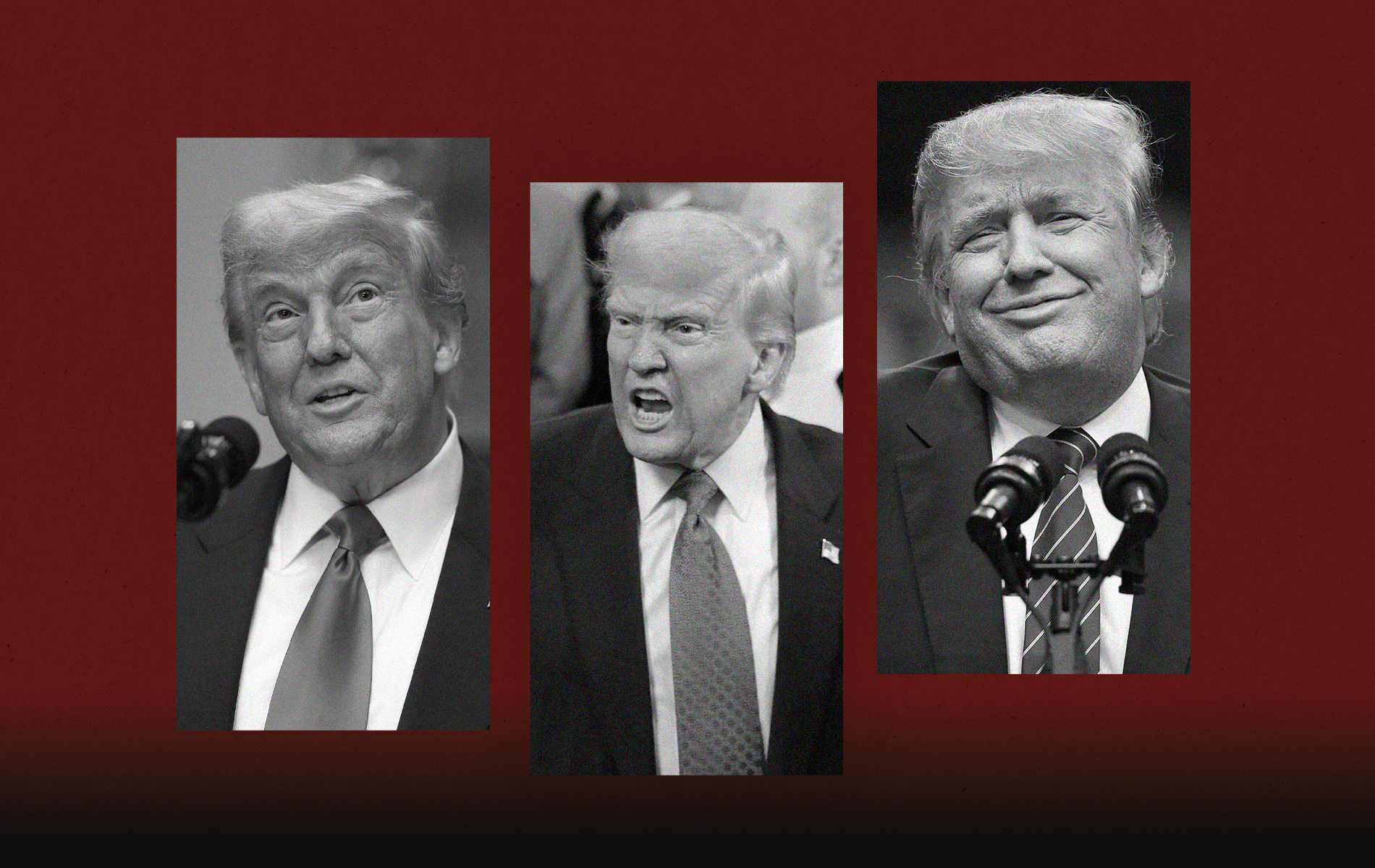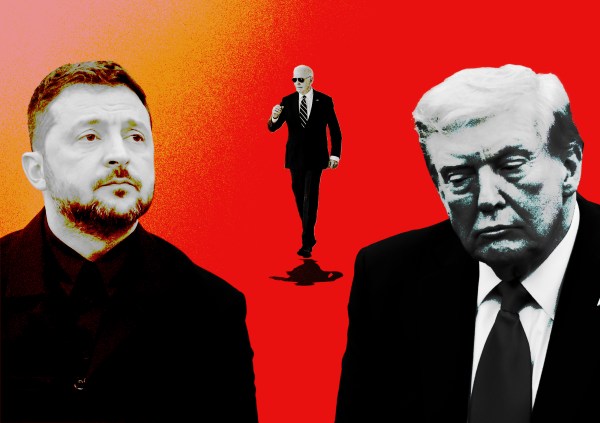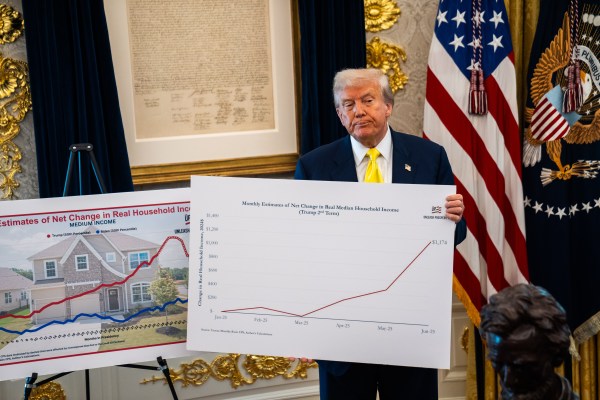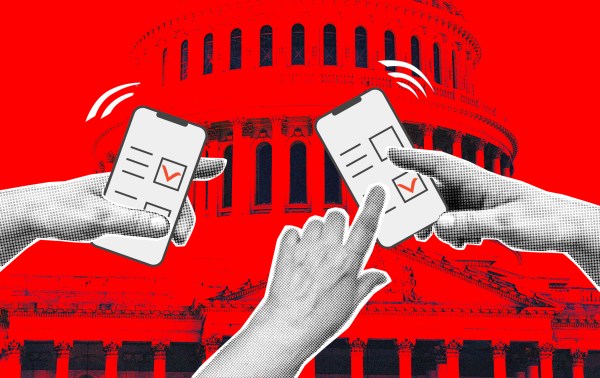Lost in the coverage of a U.S. senator getting tackled and handcuffed last Thursday at a Department of Homeland Security (DHS) press conference in Los Angeles was what happened moments before. “We are not going away,” DHS Secretary Kristi Noem had just told reporters, addressing the recent immigration raids in L.A. “We are staying here to liberate this city from the socialists and the burdensome leadership that this governor and that this mayor had placed on this country and what they have tried to insert into the city.”
The U.S. government isn’t normally in the habit of “liberating” voters from the policies of their elected representatives, but that wasn’t the most interesting thing about Noem’s comment. The interesting thing was the timing. At that very hour, on the other side of the country, her boss was backpedaling on mass deportation.
“Our great Farmers and people in the Hotel and Leisure business have been stating that our very aggressive policy on immigration is taking very good, longtime workers away from them, with those jobs being almost impossible to replace,” the president declared in an inimitably capitalized social media post. He repeated the point later at the White House, saying of illegal immigrants who work on farms, “They’re not citizens, but they’ve turned out to be great. … We can’t take farmers, and take all their people and send them back.”
Within hours, DHS made it official. “Effective today, please hold on all work site enforcement investigations/operations on agriculture (including aquaculture and meat packing plants), restaurants and operating hotels,” a senior ICE agent stated in an email to regional deputies. Pursuing criminal activity within those industries was fine, the guidance went on to say, but “noncriminal collaterals”—i.e., the vast, vast majority of illegal immigrants—were off-limits.
Just like that, mass deportation was dead. Trump’s political enemies, led by the man from whom DHS is supposedly liberating Californians, took a victory lap.
As a non-paying reader, you are receiving a truncated version of Boiling Frogs. You can read Nick’s full newsletter on Donald Trump and his policy flip-flops by becoming a member here.
Then, on Sunday night, the guidance changed again. “ICE Officers are herewith ordered, by notice of this TRUTH,” to crack down on illegal immigrants in liberal sanctuary cities like New York, Chicago, and L.A., Donald Trump wrote in a screed on Truth Social. “These, and other such Cities, are the core of the Democrat Power Center, where they use Illegal Aliens to expand their Voter Base, cheat in Elections, and grow the Welfare State, robbing good paying Jobs and Benefits from Hardworking American Citizens. These Radical Left Democrats are sick of mind, hate our Country, and actually want to destroy our Inner Cities — And they are doing a good job of it!”
It’s hard to make sense of a national immigration policy that’s insane enough to treat cheating in elections as a key consideration, but I took Trump to mean that he intends to go forward with a two-track enforcement scheme. In major cities, mass deportation will continue; in the rest of the country, it’s over. Which, whether by design or by happenstance, would bring him into line with Noem’s notion of using immigration enforcement as a political weapon to wreak havoc on strongholds governed by the other party in the name of “liberation.”
Call it a red-meat retreat.
Essential Trumpism.
Scaling back mass deportation so that it applies only to “Democrat Power Centers” is Trumpism in its purest form, the ne plus ultra of his governing style.
It’s an unusually literal example of the autocratic credo “For my friends, everything, for my enemies, the law.” Rural Republican businesses are functionally exempt from immigration statutes. Urban Democratic ones are not.
It reimagines political opponents as wartime enemies to be vanquished. “Liberation” is a military term, after all, describing the process of forcibly ousting an army from territory that it has no right to occupy. Trump’s own language reeks of the kind of demonization that’s typically reserved for foreign threats—“sick of mind, hate our Country, and actually want to destroy our Inner Cities.” One would think he’d be more restrained so soon after one of his supporters (allegedly) shot two Democratic politicians and their spouses in Minnesota, killing two, but no.
It also creates the conditions for further authoritarian shows of force. Disruptive raids at businesses in major cities are destined to inspire local backlashes, and local backlashes are the ideal pretext for sending National Guard troops and Marines to keep the peace. Trump’s cronies were already “gleeful” that they got to send in the military in Los Angeles; If anything, making it known that there’s an overt partisan double standard in enforcing immigration law will only encourage more anger in jurisdictions Trump hopes to “liberate.”
And it gives him an excuse to use state power to settle a grudge, as he’s wont to do.
There’s another way in which two-track enforcement is a perfectly executed example of Trumpism at work, though. It’s yet another case of the president wildly overreaching out of hubris and stupidity, then retreating hastily to limit the economic damage caused by his own policy, and then settling for some watered-down version of the original policy that targets a particular political enemy in hopes of mollifying his fans.
That’s what happened with the “Liberation Day” tariffs. On April 2, Trump announced massive new levies on nearly every nation on Earth, spooking the stock and bond markets. A week later, he pivoted and lowered the rates uniformly to 10 percent—except for China, which remained stuck with a mind-bending 145 percent tariff until an agreement between the two countries reduced the rate to (a still steep) 55 percent.
That was a red-meat retreat. His initial policy was idiotic in its ambition and threatened to wreck the economy, but he couldn’t abandon it entirely without losing face, especially among MAGA chumps who’d dutifully defended it. So he threw them some political red meat by bearing down on China, the job-stealing scourge of American populist-nationalists. I think he calculated that his supporters wouldn’t feel betrayed or embarrassed by seeing him reverse himself so quickly as long as he continued to use the policy to punish one of their bête noires.
Any enemy will do.
The same thing is happening now with immigration.
Egged on by Stephen Miller to boost the daily number of arrests, ICE began rounding up illegal immigrant laborers on the job. Problem one: If you suddenly pull dozens of illegal workers off of, say, a farm, the farm can’t operate. Problem two: As word gets around among other illegals that farms are a target, they’ll stop showing up to their own farm jobs, and then those farms can’t operate. Soon, farms are shutting down en masse—and hotels, and restaurants, and meatpacking plants, and every other industry that depends heavily on illegal labor.
Somehow, the president and his team were too dopey to anticipate that, just as they were too dopey to anticipate the market reaction to “Liberation Day,” never mind that tariffs and mass deportation are core policies of his program, whose logical implications should have been thoroughly thought through. But farmers have now helpfully explained it to their contacts in Washington, and those contacts have relayed their complaints to Trump, and voila: Mass deportation is canceled.
Here again, though, the president couldn’t simply abandon a pillar of his policy agenda. Immigration enforcement is his bread and butter, one of the few issues on which he enjoys majority support across the general electorate. His fans would never understand how he had gotten so squeamish so soon about one of his core convictions. The whole point of deportation is to oust illegals who have taken jobs that rightly belong to natives, no? Trump was supposedly going to “liberate” the labor force from the occupiers who have stood in the way of Americans getting to live their dreams of becoming housekeepers in Las Vegas. And then, suddenly, he wasn’t.
He needs to make it up to them for having retreated, and he’s going to do it by pivoting to lib-owning. He’ll leave the maids and dishwashers and day-laborers alone … except in the big progressive cities that MAGA hates, where he and ICE intend to turn things upside down. He won’t liberate the U.S. labor force, but he will try to bring California’s economy to its knees and make Gavin Newsom cry.
And for most of his fans, that’ll be fine. With rare exceptions like Steve Bannon and Tucker Carlson, populists aren’t ideologues. They don’t care if their policies get implemented so long as their enemies suffer one way or another. Trump’s Sunday night post is his pledge to them to punish Democrats in lieu of punishing illegals en masse. It’s a red-meat retreat.
It won’t be the last.
An unusually fickle White House.
Every administration is pulled in different directions by its own base. Republican or Democrat, there’s always some puritanical wing of ideologues pressuring the White House not to compromise and some pragmatist wing of moderates that’s consumed with the art of the possible. And so every president vacillates a bit on policy, sometimes driving a hard bargain to keep the ideologues happy, at other times making a deal to protect the moderates.
Trump’s administration is more prone to changing its mind than most, though. On a surprisingly diverse number of issues so far, he’s either backed away from his original policy or no longer talks about it much. Why?
Partly it’s the nature of the president himself. Not only is he not very ideological apart from a few subjects, his narcissism is so overweening that he’s willing to accommodate any strain of right-wing thought inside his tent as long as it comes packaged with admiration for him. His instincts may be isolationist, but he’s allowed hawks like Lindsey Graham to whisper in his ear for nearly 10 years about the virtues of bombing Iran because Graham belongs to the Church of Trump. A more traditionally ideological president wouldn’t have permitted that.
Partly it’s the fact that, true to the spirit of its leader, Trump’s movement also isn’t very ideological. There are exceptions, as I said above, but the average MAGA Republican believes in nothing more highly than it does the president and his instincts. Ruthlessness toward cultural enemies, hurting the people who need to be hurt, is more important than any particular policy. That gives Trump a freakish degree of latitude with which to maneuver politically and makes his red-meat retreats possible. Most presidents haven’t been able to satisfy their base simply by being malevolent enough toward the right targets.
Partly, it’s a function of Trump’s administration being more willing to test norms than its predecessors. No other modern White House would have had a change of heart about Kilmar Abrego Garcia because no other modern White House would have sent a detainee to a gulag on another continent in violation of a court order in the first place. Nor would any have launched a trade war on the entire planet at once, or risked millions of illegal immigrant laborers going to ground simultaneously by launching workplace raids across the country. An administration that’s more willing to try crazy things will also have more cause to retreat.
Yet Trump is also in a different position than other presidents because, uniquely, he’s led a successful political revolution.
Historically, each party’s radical wing has understood that it’s a minority and has aimed to pressure the dominant establishment into moving incrementally toward its agenda. Trump is the great exception: The postliberal radical faction that he galvanized in 2016 actually ousted the GOP’s Reaganite ancien régime. He’s not just a party chief or a president, he’s a victorious revolutionary. And so, to a degree that Joe Biden or Barack Obama or George W. Bush never had to face, there’s an expectation that he’ll continue to stand for the revolutionary ideals that brought him to power.
He’s tried to meet that expectation. The problem, as often happens with successful revolutions, is that the revolutionary agenda quickly proves to be stupid or unworkable or both, forcing the new regime either to hastily retreat or accept serious pain to implement its vision. Trump, having a low pain threshold, favors retreat.
An incomplete revolution.
There’s a second problem in his case: Although his postliberal faction is now in command, it hasn’t entirely indoctrinated the tens of millions of people who still call themselves Republicans yet hold generally Reaganite views on business, foreign policy, and smaller government. The downside of turning a political party into a personality cult is that loyalty is geared toward the personality, not toward that personality’s politics.
And so Trump now presides over an incomplete revolution, one filled with earnest populists but also many semi-unreconstructed conservatives, enough so to influence him on certain policies. Look no further for an example than Israel’s surprise attack on Iran last week, which caused nationalist ideologues like Tucker Carlson to throw a tantrum about Trump’s complicity. Supporting a major Middle Eastern war isn’t “America First,” the Tuckerites exclaimed!
To which Trump, in an interview with The Atlantic, calmly replied, “Well, considering that I’m the one that developed ‘America First,’ and considering that the term wasn’t used until I came along, I think I’m the one that decides that.”
That’s what an incomplete revolution sounds like. “America First” has won—but it means only what Trump says it means, and sometimes it’s going to mean things that a heavy majority of Republicans still favor, like support for Israel, even if populists don’t. The Tucker Carlsons have more influence, but the Mark Levins still sometimes get their way.
No wonder, then, that the president and his administration change their minds more often than their predecessors did. The GOP base is a mess ideologically, most of the party’s voters are clinging to Trump’s whims for guidance, and markets keep sending signals on issues like tariffs and mass deportation that favor more moderate policies. Revolutions usually bring chaos. This one is no exception.
Which means there are destined to be more red-meat retreats—that is, more cases of Trump following his revolutionary instincts, quickly causing a disaster, and then retreating to a more modest position in which he beats up on some revolutionary enemy in order to appease his disappointed base.
Vaccine policy is the obvious prospect. Robert F. Kennedy Jr. is in the process of wrecking America’s ability to thoughtfully regulate vaccination, and at some point, that will come back to bite Trump. A public backlash will gather as parents run into difficulty trying to get their kids immunized, and the president will retreat, either firing Kennedy or (more likely) pressuring him and his deputies to greenlight vaccines that have been held up.
But the nuttiest populists will find that disappointing, so Trump will have to throw them a bone. My guess is that he’ll declare some sort of moratorium on funding mRNA technology in order to satisfy the many red-state paranoiacs who believe there’s an unreported epidemic of people dropping dead due to the COVID shot.
That would be a classic red-meat retreat. As long as some part of American culture is being “liberated” from the enemy’s program, it doesn’t much matter which it is. That’s how policy decisions in America are made now, 10 years to the day that Trump rode down the escalator in the tower named after him. Happy anniversary.










Please note that we at The Dispatch hold ourselves, our work, and our commenters to a higher standard than other places on the internet. We welcome comments that foster genuine debate or discussion—including comments critical of us or our work—but responses that include ad hominem attacks on fellow Dispatch members or are intended to stoke fear and anger may be moderated.
With your membership, you only have the ability to comment on The Morning Dispatch articles. Consider upgrading to join the conversation everywhere.